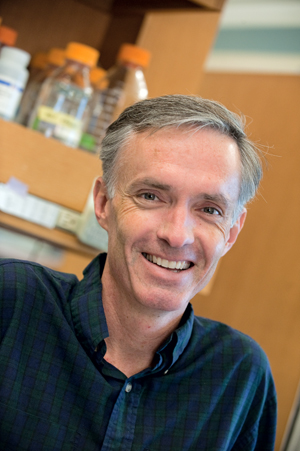ENG’s James Collins Honored for Research
Elected to National Academy of Engineers

James J. Collins has been elected to the National Academy of Engineering (NAE), the third current Boston University professor to be so honored. The William Fairfield Warren Distinguished Professor and College of Engineering professor of biomedical engineering was chosen for his contributions to synthetic biology and engineered gene networks.
“Election to the National Academy of Engineering is a high honor,” says President Robert A. Brown, who has been a member of the academy since 1991. “It is a recognition of the quality of creativity and intellectual leadership that Jim has demonstrated in his still young research career.”
Collins is one of 68 new members and 9 foreign associates of the NAE. Brown was elected for research conducted at MIT into the application of computing techniques to fundamental and practical problems in fluid mechanics, rheology, and crystal growth, and Farouk El-Baz, a Graduate School of Arts & Sciences research professor and director of the Center for Remote Sensing, was elected for work done at BU in 2002 for NASA in selecting the landing sites for the Apollo missions, and for pioneering methods of discovering subsurface freshwater from space observations. The NAE has 2,290 U.S. members and 202 foreign associates.
The 45-year-old Collins, who is also codirector of the Center for BioDynamics, says he is “thrilled and honored” by his election. “I have benefited tremendously from the marvelous community we have in the College of Engineering,” he says, “as well as from all of our talented students and postdocs.”
NAE membership honors those who have made outstanding contributions to “engineering research, practice, or education, including, where appropriate, significant contributions to the engineering literature,” and to the “pioneering of new and developing fields of technology, making major advancements in traditional fields of engineering, or developing/implementing innovative approaches to engineering education.”
Collins’ research focuses on developing nonlinear dynamical techniques and devices to improve and mimic biological function. His work in complexity science has spurred new devices to treat stroke-induced brain failure, enhanced doctors’ understanding of how human posture is warped by aging and Parkinson’s disease, and helped invent synthetic gene networks, whose many uses include fighting bacterial infections. Winner in 2000 of the University’s highest teaching honor, the Metcalf Cup and Prize, he is famous among engineering students for his ability to make extremely complex concepts understandable, and often funny.
Last year, Collins received the 2010 Lagrange-CRT Foundation Prize, given by the Institute for Scientific Interchange Foundation in Turin, Italy, for “outstanding contributions relevant to the progress of complexity science.” A Rhodes scholar, he won a MacArthur “genius” award in 2003. Two years later, Scientific American named him one of the 50 top leaders in science and technology. In 2008 he became BU’s first Howard Hughes Medical Institute investigator, a position he holds concurrently with his BU appointment. He earned a BA from the College of the Holy Cross and a PhD from Oxford University.
Art Jahnke can be reached at jahnke@bu.edu.

Comments & Discussion
Boston University moderates comments to facilitate an informed, substantive, civil conversation. Abusive, profane, self-promotional, misleading, incoherent or off-topic comments will be rejected. Moderators are staffed during regular business hours (EST) and can only accept comments written in English. Statistics or facts must include a citation or a link to the citation.